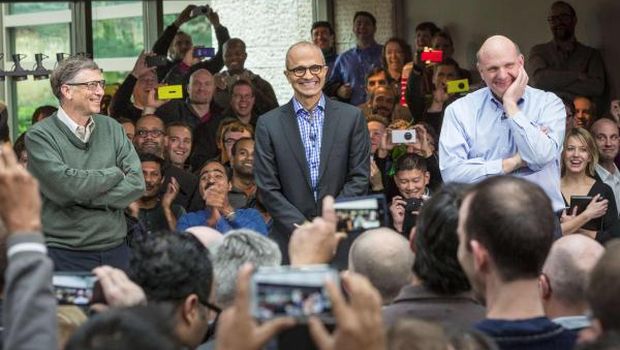
Satya Nadella, center, Microsoft’s new CEO, addresses employees along with founder and technology advisor Bill Gates, left, and outgoing CEO Steve Ballmer, on the company’s campus in Redmond, Washington on February 4, 2014. (Reuters/Microsoft/Handout via Reuters)
Los Angeles, AP—As longtime Microsoft insider Satya Nadella becomes the company’s CEO, he is declaring a new focus on a “mobile-first, cloud-first world.” So far, he only has the latter half of the formula figured out.
Microsoft is trying to catch rivals such as Apple, Google and Amazon, who are building a thriving ecosystem for mobile devices. At the same time, the company wants to expand its business as a provider of software and services over the Internet.
Nadella, the Indian-born head of Microsoft’s cloud computing business, was named Tuesday to be Steve Ballmer’s immediate replacement. He is only the third chief executive in Microsoft’s 38-year history.
The 22-year Microsoft veteran has enlisted the help of company founder and first CEO Bill Gates, who is leaving his role as chairman to serve a more hands-on role as an adviser at Nadella’s request. Gates will spend a third of his time working on products and technology and will remain on the company’s board.
Nadella, 46, led the company’s small but growing cloud computing unit, in which customers pay Microsoft to house data and run applications on distant servers connected to the Internet. Those services are a departure from Microsoft’s traditional business of making software for installation directly onto personal computers.
In addition to growing that business, one of Nadella’s first tasks as CEO will be to complete Microsoft’s 7.3 billion US dollar purchase of Nokia’s phone business and patent rights, part of a plan to boost Windows Phone software in a market dominated by iPhones and Android devices.
“Going forward, it’s a mobile-first, cloud-first world,” Nadella said Tuesday in a video accompanying the announcement.
He said he would capitalize on Microsoft’s experience making the industry’s leading productivity software package, Office.
The new Microsoft chairman will be board member John Thompson, who led the search for a new CEO after Ballmer said in August that he planned to step down.
Thompson said Nadella was the board’s “first and unanimous choice.” Other candidates the company considered included Ford CEO Alan Mulally and other insiders such as Chief Operating Officer Kevin Turner and former Skype head Tony Bates.
Nadella has “the right background to lead the company in this era,” Gates said in a video message. “There’s a challenge in mobile computing. There’s an opportunity in the cloud.”
Nadella has been an executive in some of the company’s fastest-growing and most profitable businesses, including its Office and server and tools business. In three years as server and tools president, he helped grow that business into one with 20 billion dollars in annual revenue, about a quarter of Microsoft’s total revenue in the most recent fiscal year.
For the past seven months, he was the executive vice president who led Microsoft’s cloud computing offerings. Nadella’s new cloud enterprise group has also been growing strongly, more than doubling customers in the latest quarter, although it remains a small part of Microsoft’s current business.
Analysts hope that Nadella can maintain the company’s momentum in cloud computing and business software while minimizing the effects of unprofitable forays into consumer hardware. It’s a transition IBM succeeded in making in the 1990s, but one which companies such as Hewlett Packard and Dell have struggled with.
Microsoft shares fell 13 cents Tuesday to close at 36.35 dollars.
Nadella’s appointment comes at a time of turmoil for Microsoft. Founded in 1975 by Gates and Paul Allen, the company has always made software that powered computers made by others.
But Microsoft has been late adapting to changes in the technology industry as PC sales declined. It allowed Google to dominate online search and advertising, and it watched as iPhones, iPads and Android devices grew. Microsoft’s attempts to manufacture its own devices have been marred by problems.
Analysts see hope in some of the businesses Nadella had a key role in creating.
Microsoft’s cloud computing offering, Azure, and its push to have consumers buy Office software as a 100-dollar-a-year Office 365 subscription are seen as the biggest drivers of Microsoft’s growth in the next couple of years. Both businesses saw the number of customers more than double in the last three months of the year, compared with a year earlier.
Nadella is a technologist, fulfilling the requirement that Gates set out at the company’s November shareholder meeting, where the Microsoft chairman said the company’s new leader must have “a lot of comfort in leading a highly technical organization.”
Nadella will be well rewarded. Securities filings show he will have a target annual pay package of 18 million dollars, as well as a one-time stock award with a value aimed at 21.8 million dollars. But that could increase if the company performs well.
Born in Hyderabad, India, in 1967, Nadella joined Microsoft in 1992 after being a member of the technology staff at Sun Microsystems.
Partly because of his insider status and the fact that both Gates and Ballmer will remain among Microsoft’s largest shareholders and company directors, analysts are not expecting a quick pivot in the company’s strategy.
But some observers hope for big changes that will help lift Microsoft stock. Since Ballmer took office on January 13, 2000, Microsoft shares are down a split-adjusted 32 percent, compared with a 20 percent gain in the S&P 500.
The upside to naming an insider is “he’ll be able to hit the ground running,” said Morningstar analyst Norman Young. “The downside, of course, is that he has very little to no experience on the consumer side of the business.”
